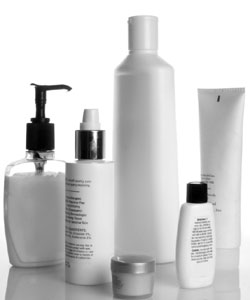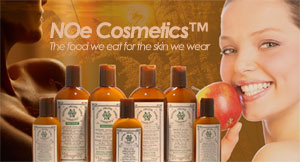Why All the Fuss About Paraben in Cosmetic Products?
Have you ever taken a close look at the cosmetics, lotions, and hair care and skin care items in your own bathroom? Likely the words "natural" and "organic" jump out at you from many of the labels.
But flip the bottle over and take a closer look at the ingredient list. You'll see another word crop up just as frequently: parabens.

Parabens are preservatives commonly found in shampoo, makeup, skin lotions, creams, foaming cleansers, lipsticks, lip glosses, deodorants and shaving gels to protect them from bacterial and fungal contamination. And there's nothing natural or organic about them.
More and more women are becoming concerned that their so-called natural, nontoxic hair care products and cosmetics could indeed be toxic. For several years now, the scientific community has been raising red flags about parabens and their health effects, especially on women.
As far back as 1998, researchers reported: "Given (parabens') use in a wide range of commercially available topical preparations, it is suggested that the safety in use of these chemicals should be reassessed...." But so far, it hasn't been and parabens are still in wide use.
The Problem With Parabens
Opponents say parabens, particularly butylparaben, disrupt normal hormone functioning by mimicking estrogen. Scientific evidence suggests exposure to estrogen and substances that behave like estrogen may increase a woman's risk of developing breast cancer.
Even more troubling, parabens are being used in products like lotions, deodorants, and make-up that stay on the skin for long periods of time, being absorbed directly into the body. Some scientists are concerned that parabens could migrate through the skin and into the bloodstream, bypassing the gastrointestinal system, which normally breaks down and eliminates toxins from the body.
In one story published by UK Daily Mail newspaper based on laboratory study by researchers from the University of Reading – paraben been found in tissue samples from 40 women with breast cancer and raised the question “where have these chemicals come from?” Later on the story got criticised by NHS (UK National Health Service) to be exaggerated and stated “This analysis only looked at tissue taken from 40 women with breast cancer and did not compare them with tissue samples from women who had not had cancer. It does not prove that parabens caused these cancers, and it does not suggest that parabens have any association with breast cancer development.” And a similar reaction was published by FDA – “FDA believes that at the present time there is no reason for consumers to be concerned about the use of cosmetics containing parabens.”
So why would all these companies who are trying to convince us that their beauty products are natural and healthy continue to use an ingredient that has come under such scientific scrutiny?
The companies that use parabens defend them, saying they've been in use 70 years and are approved by such bodies as the World Health Organization and the Cosmetic Ingredient Review (CIR) panel in the US.
While it's true there have been no studies that prove beyond a doubt that parabens increase the risk of cancer, the debate continues over whether the preservative should be in use at all until we know for sure that it's safe.
Paraben-Free Hair and Skin Care Products
Some beauty product companies are not waiting for the scientific evidence to slowly roll in they're acting now to create nontoxic hair care products, lotions and cosmetics that use natural alternatives to parabens.
Todd Heeg, the president and CEO of Therapeutic Technologies, has responded to concerns about possible negative effects from long-term exposure to parabens by formulating paraben-free hair care products. Their shampoos and conditioners contain a natural preservative from Italy one that prevents bacteria without the potential health risks.
According to Sean Campbell managing director of NOe Cosmetics (Natural Organic edible Cosmetics) Up to 60% of whatever we place on our skin goes into our blood stream.

Given that we already have on average 91 chemicals in our bodies that dont belong there, many of which are often triggers for some of the illnesses that affect us, the implications of lathering ourselves with more chemicals doesnt make a lot of sense. The product line offers hair and skin care products that are 100% Organic actives and free of petrochemicals, dyes, preservatives, additives and paraben.
Other forward-thinking manufacturers are turning to essential oils such as caraway, cinnamon, eucalyptus, lavender, lemon, rose, sandalwood, and tea tree, which when distilled, are potent enough to act as natural antiseptics, antifungals and antibacterials. Parabens have also been replaced with grapefruit seed extract and Vitamin E in certain nontoxic hair care products and cosmetics.
So some companies really do understand the meaning of the words "natural" and "organic" and know how to create beauty products that live up to today's health standards.
For all the others... well, all we can do is keep reading labels, be informed consumers, and avoid products that we don't feel comfortable with.

